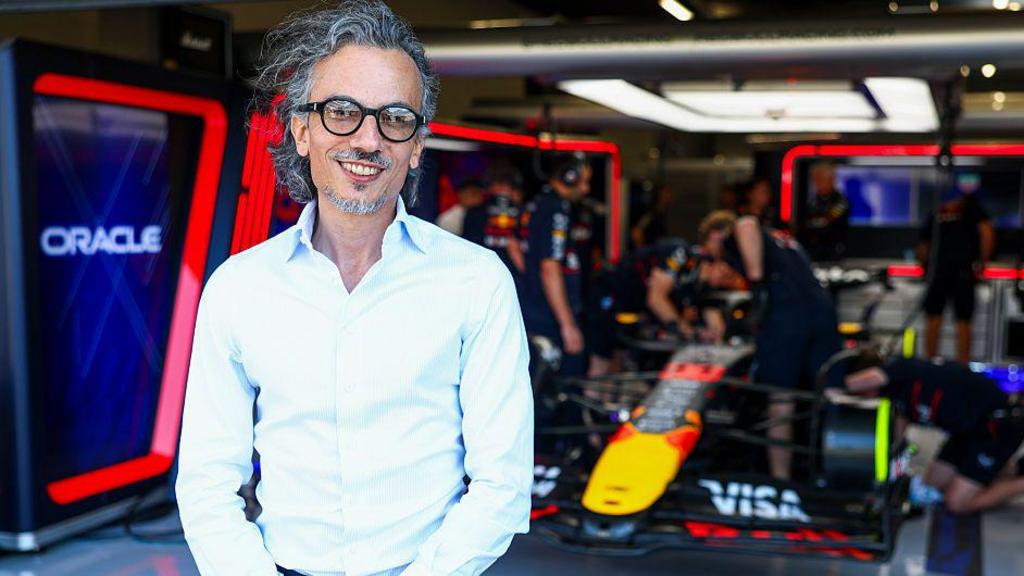Laurent Mekies’s Formula 1 journey commenced with Arrows in 2001.
Laurent Mekies is expected to adopt a measured and collaborative leadership style at Red Bull Racing, particularly during his initial period with the team.
The 48-year-old executive assumes the roles of team principal and chief executive officer following Christian Horner’s dismissal by shareholders, which occurred three days after the British Grand Prix.
Mekies’s primary objective will be to revitalize the team’s performance after a period of competitive decline spanning the past 18 months.
The Belgian Grand Prix presents an opportune moment for Mekies to make his first public appearance in his new capacity, potentially setting a positive tone for his tenure.
Horner’s departure from Red Bull: An overview of the events and reasons
Will Verstappen’s allegiance to Red Bull be influenced by Horner’s exit?
Comprehensive coverage of the Belgian Grand Prix on the BBC
While Red Bull’s lead driver, Max Verstappen, has faced challenges in consistently matching the pace of McLaren’s Oscar Piastri and Lando Norris, he has excelled on circuits characterized by high-speed sections, similar to Belgium’s Spa-Francorchamps.
Notably, Verstappen secured pole position at the high-speed Silverstone circuit three weeks prior, although his race was compromised by wet conditions resulting from Red Bull’s low-downforce setup.
Spa is renowned for its demanding, fast corners, reminiscent of Suzuka, where Verstappen previously achieved victory from pole position, suggesting a potential repeat performance this weekend.
However, a strong showing at Spa, while beneficial for the new Mekies-led Red Bull, would not necessarily indicate a resolution to the team’s underlying issues.
The team’s recent struggles played a significant role in Horner’s departure, as shareholders grew dissatisfied with his control and perceived internal divisions within the team.
Despite recent challenges, the team retains the core elements that led to its dominant performance two years ago, when Verstappen secured seven of the first 10 races, laying the foundation for his fourth world title.
Mekies emphasized his commitment to maximizing the potential of “this incredible team” in a video released by Red Bull.
With over two decades of experience in F1, including roles at the FIA, Ferrari, and Red Bull’s junior team, Mekies already possesses strong relationships with key personnel at Red Bull, such as technical director Pierre Wache and head of engineering Paul Monaghan.
Red Bull’s Max Verstappen has emerged victorious in three of the past four Belgian Grands Prix at the iconic Spa-Francorchamps circuit.
Mekies has spent the past two weeks familiarizing himself with the staff at Red Bull’s base in Milton Keynes. The Spa race provides an opportunity to observe firsthand a team that, despite recent challenges, remains highly regarded for its strategic prowess and adaptability.
Mekies aims to “discover the magic” within the team and intends to spend his initial weeks “listening to the people to try to understand this beautiful magic machine that is Red Bull F1, and eventually find a way to contribute and support.”
Under Horner’s leadership, Red Bull exhibited a unique dichotomy, characterized by a hierarchical structure and a focus on maximizing the creativity of design chief Adrian Newey.
This approach yielded considerable success, including eight drivers’ titles, six constructors’ championships, and 124 grand prix wins. Even during periods of reduced competitiveness, Red Bull’s chassis was consistently recognized as among the best in the field, with Renault’s power units being the primary limitation.
Red Bull’s competitive decline coincided with Newey’s departure, raising questions about the extent to which this event contributed to the team’s struggles. The emergence of McLaren and the limitations of Red Bull’s current car-design philosophy likely played a role as well.
With both Horner and Newey now gone, Red Bull is entering a new era, requiring Mekies to build a team capable of returning to the top without Newey’s direct influence.
Could Aston Martin emerge as a contender for Verstappen’s signature?
Christian Horner (left, with Laurent Mekies) served as Red Bull team principal for two decades.
Horner faced allegations of sexual harassment and coercive behavior from a female employee, which were dismissed by two internal investigations and consistently denied by Horner.
During his tenure, the team lost key figures such as Newey, sporting director Jonathan Wheatley, and head of strategy Will Courtenay, who is expected to join McLaren in the future.
Horner’s confrontational approach led Mercedes F1 boss Toto Wolff to describe him as a “yapping little terrier,” an image that Horner himself acknowledged in the Netflix series Drive to Survive.
Horner cultivated this image over many years, particularly during the dramatic 2021 season, marked by his interactions with former race director Michael Masi, which directly influenced Verstappen’s championship victory over Lewis Hamilton.
A team’s culture reflects its leadership, which may explain why Red Bull has become a team that many fans love to hate.
Red Bull’s brand image is associated with edginess and disruption. However, under Horner’s control, shareholders felt that the team had lost some of its original spirit.
Mekies’s arrival presents an opportunity for a fresh start, as he possesses a different character than Horner.
With his extensive engineering background, Mekies can engage with the technical team on a deep level.
McLaren Racing chief executive officer Zak Brown has described Andrea Stella, who has revitalized McLaren since becoming team boss in 2022, as a “technical team principal,” a description that also applies to Mekies.
Mekies appears to be a softer, less adversarial character than Horner, suggesting a potentially different approach to external disputes.
The controversies surrounding Horner had fostered a sense of siege mentality at Red Bull.
Mekies’s arrival offers a chance for a change in culture and for Red Bull to forge new relationships with its rivals, the sport, and its audience.
Comments can not be loaded
To load Comments you need to enable JavaScript in your browser

